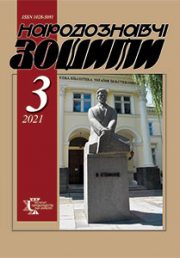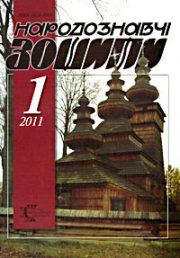The Ethnology Notebooks. 2018, 3 (141), 635–641
UDK 75.052
DOI https://doi.org/10.15407/nz2018.03.635
MONUMENTAL ART IN THE MIDDLE AGES
Kozhekov Oleksii Vasyloyich, professor
National Academy of Fine Arts and Architecture,
department of Painting and Composition.
Voznesenskyi Uzviz Street 20, 04053, Kyiv, Ukraine.
Abstrakt. In article the research of monumental painting in the different countries of the world in the period of the Middle Ages is conducted. Definition of monumental art and monumental painting is offered. The general periodization of medieval monumental painting is revealed. Differences between secular and church monumental painting (are analyzed at the sheer domination of the last during the Middle Ages). It is established that the receptions and canons developed in church painting have defined character of all fine arts of the Middle Ages. Concrete examples of medieval monumental art in the territory of Italy, Germany, France, Spain, and England are investigated. It is proved that monumental painting has lost the value having in medieval art of the Romance period during the Gothic period.
Keywords: monumental painting, monumental art, Middle Ages, pre-Roman period, Romance period, Gothic period, era, history, church, religion.
Received 25.03.2018
References
Anoricheva-Yer’omka, A.I. (2009). Akademichnyj zhyvopys. Kharkivs’ka derzh. akademiia dyzajnu i mystetstv. Kharkiv: Koloryt [in Ukrainian].
Holovchak, P.I. (2008). Zhyvopys, monumental’ni roboty, skul’ptura, hrafika: kataloh mystets’kykh robit. Ternopil’: Pidruchnyky i posibnyky [in Ukrainian].
Danylov, V.P. (2008). Monumental’ne ta dekoratyvne mystetstvo. Zhyvopys. Hrafika: al’bom reproduktsij. Dnipropetrovs’k: Lira [in Ukrainian].
Kulish, O.A. (2016). Monumental’ne mystetstvo. Cherkasy: ChNU im. B. Khmel’nyts’koho [in Ukrainian].
Mykhajlo Bojchuk ta joho shkola monumental’noho mystetstva: al’bom. (2010). (eds. ker. proektu A. Mel’nyk; avt. tekstu: L. Koval’s’ka, N. Prystalenko). Kyiv: NKhMU [in Ukrainian].
Mokryts’kyj, H.P. (2010, 23 kvit. – 10 trav.). Pam’iatky monumental’noho mystetstva Zhytomyrs’koi oblasti: fotovyst. Heorhiia Mokryts’koho: kat. fotovyst. Zhytomyr: Volyn’ [in Ukrainian].
Nessel’shtraus, C.G. (1964). Iskusstvo Zapadnoj Evropy v srednie veka. Leningrad; Moskva : Iskusstvo [in Russian].
Pastukh, R.I. (2012). Monumental’na Stryjschyna. Drohobych: Posvit [in Ukrainian].
Simonova, A.V. (2015). Vizantijs’ki tradytsii v suchasnykh rozpysakh pravoslavnykh khramiv Ukrainy (kinets’ XX — pochatok XXI st.). Kharkiv. derzh. akad. dyzajnu i mystetstv [in Ukrainian].
Taranushenko, S.A. (2014). Derev’iana monumental’na arkhitektura Livoberezhnoi Ukrainy. Kharkiv: Savchuk O.O. [in Ukrainian].
Filatov, V.V. (1995). Restavracija nastennoj masljanoj zhivopisi. Moskva: Izobrazitel’noe iskusstvo [in Russian].
Zhuravel’, S. (ed, avt.-uporiad). (2011). Khudozhnyky Ukrainy: zhyvopys, hrafika, skul’ptura, monument.-dekor. mystets., dekor.-uzhytk. mystets.: tvorcho-biohr. al’b.-dovid. Kyiv: Zhuravel’ S.V. [in Ukrainian].
Shtohryn, A.M. (2017). Mij neovizantynizm: styl’ i manera monumental’noho maliarstva Voznesens’koi tserkvy v s. Ivankivtsi na Podilli: knyha-al’bom. Kyiv: Vyd-vo im. Oleny Telihy [in Ukrainian].
Yakymova, O.O. (2017). Obraz liudyny u monumental’nomu mystetstvi Skhidnoi Halychyny pershoi tretyny XX st.. L’viv: L’viv. nats. akad. mystetstv [in Ukrainian].
Monumental’naja zhivopis’. Retrieved from: https://ru.wikipedia.org/wiki/Монументальная_живопись.
Monumental’noe iskusstvo. Retrieved from: https://ru.wikipedia.org/wiki/Монументальное_искусство.





